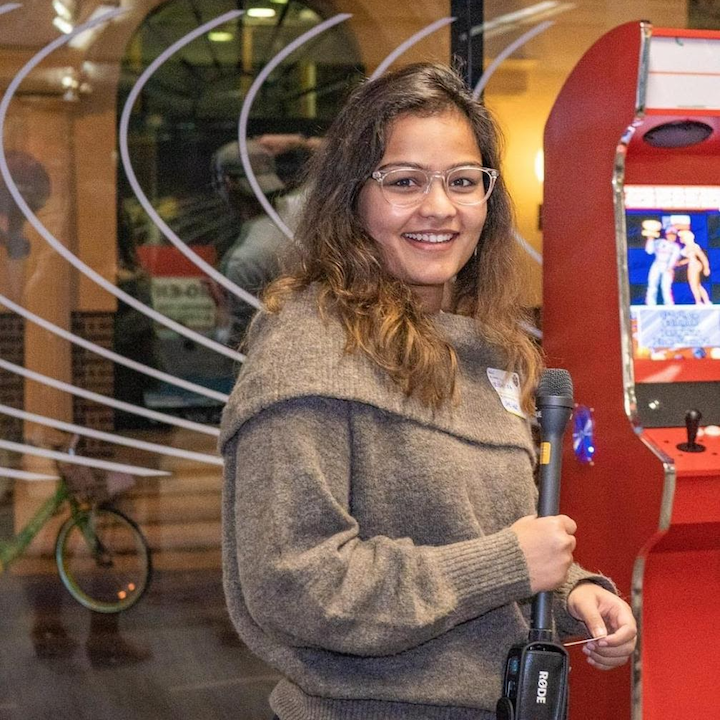Tell us a bit about yourself.
Hey there! 👋🏽 I’m Srushtika Neelakantam and I work at Ably Realtime as a Developer Advocate. From being a solo devrel to being part of a proper team now, my DevRel experience has significantly evolved in the past few years. I started off with the most standard DevRel activities like talks at events, tech writing, videos, community, etc but have had good exposure and fun along the way working on DevX, wireframing, onboarding, building tech integrations, outsourcing and managing freelancers etc.
I’m from India originally but have lived in Berlin and now based in London. I’m very talkative in real life but surprisingly anti-social when it comes to virtual meetings and catch-ups 🤷🏻♀️ Outside of the tech world, I love to play the drums (mostly from System of a Down and Muse) and travel.
How did you get into Developer Relations?
It’s a funny story actually. When I was at uni (2013 - 2017) I was actively involved with Mozilla’s Open Source community. One of the programs they had at the time was called Mozilla Techspeakers, which aimed at promoting open source technologies and practices by training its members to be good tech speakers and encouraging them to speak at tech conferences globally.
I applied and joined this community. It gave me a good headstart into the world of tech-speaking. Although I was not an expert in anything (am still not), I was encouraged to share what I had learned along the way of working on hobby projects. I loved the idea of learning something new and then simplifying it for others, by writing or talking about it.
This also gave me an opportunity to travel internationally and learn about other cultures and job markets. One of the conferences I spoke at was MobCon Europe in Sofia, Bulgaria. As with most conferences, we had a speakers’ dinner on one of the nights. There I met Phil Nash, who was at the time Developer Evangelist for Twilio. It was the first time I had heard of such a title and was very curious to know more about what is involved. From Phil’s explanation, it sounded a lot like being a Mozilla Techspeaker, only full time, with a bunch of more responsibilities but lots of fun things.
Until then I’d been thinking that after college I may not get as much time to be involved with the Mozilla Techspeakers program, considering I’ll soon have a full time (mostly software developer) job. But just the possibility of doing something like this full time got me really excited. I didn’t, however, have any reason to think I had the right skills, so I didn’t get any hopes up and soon forgot about it. This was in March of 2017 and fast forward to August 2017, I graduated from college and had a few job offers through campus placements, all for a Software Developer/ Engineer role. Speaking to a friend who was moving to Berlin, I stumbled upon a job opening for a Developer Evangelist role at a company based there. I went ahead and applied for the role ‘just for fun’, not expecting anything at all.
Surprisingly, they replied back and set up a series of interviews. After two weeks of back and forth, they extended an offer to join them as a full-time Developer Evangelist! I was beyond thrilled! But now, I had to choose between a comfortable software developer role in my home city vs treading uncharted waters in the world of DevRel in a country thousands of miles away from home. Another personal challenge was to convince my parents of this new and unexpected career direction. After a lot of deliberation and incredible support from family and friends, I decided to take up that role and thus began my journey in DevRel.
I’ve probably managed to make it sound super dramatic but this whole episode felt nothing less than that.
What advice would you give people looking to join you?
DevRel is not a black box and anyone with the right skills can join Developer Relations and excel in it. I’d also like to warn you though that DevRel is not all a bed of roses, so it’s important to manage your expectations and understand it properly. There are very exciting elements to it but also, it drains a lot more of your energy and time compared to some other roles in the tech industry. It’s just about finding the right fit and what makes you happy. Here’s a detailed article I wrote a couple of years back where I outline all things you may need to consider before jumping on the DevRel bandwagon - A fresher’s guide to DevRel.
How has your role changed in the past year?
I’m going to steal my boss, Ben Gamble’s phrase here to describe my role and in general our DevRel team in the past year - “An overnight success, one year in the making”. I’ve had many personal achievements this year, in terms of becoming technically strong, to creating viral content (my blog series on building multiplayer games became the top result on Google), to contributing strategic ideas for expanding the impact of Developer Relations amidst the pandemic. We are seeing all the results come together now but really, it is all a result of our activities in the past year.
Earlier, I had a very broad role. With a bit of everything, my time was spread too thin on any one thing to have a significant impact. But thanks to the crazy growth of Ably as a company, my role is now much more focused and hence much more impactful.
How do you see the future of DevRel?
It is a known fact that DevRel is super hot right now. With a limited pool of people who understand this field accurately, the popularity has only risen since.
I do think DevRel is maturing at a fast pace. Even in the last three years that I’ve been involved with it, DevRel has changed significantly. To put it very simply, DevRel is a bridge between everything in a developer-facing company, be it between the various tech and commercial departments or between the external community and internal staff.
This means that there’s a lot that goes on in a DevRel team and much of that work can be categorized into different segments. For example, a DevRel team is most likely to be deeply involved in sales engineering, developer experience (UX, docs, dev tools), insights into the product roadmap, customer support, partnerships and alliances, testing a new product, co-marketing campaigns, etc.
For a good-sized team, you could divide the DevRel engineers to focus on one or two of the internal departments each for a much greater impact. This would lead to continued collaboration and expertise in specific areas. I believe that’s the direction DevRel is headed towards right now.




